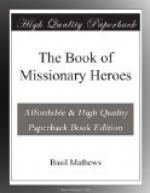Mackay at once searched the hill-side with his spade and found a bed of clay emerging from the side of the hill. He climbed sixteen feet higher up the hill and, bringing the men who could help him together, began digging. He knew that he would reach spring water at the level of the clay, for the rains that had filtered through the earth would stop there.
The Baganda[54] thought that he was mad. “Whoever,” they asked one another, “heard of digging in the top of a hill for water?”
“When the hole is so deep,” said Mackay, measuring out sixteen feet, “water will come, pure and clean, and you will not need to carry it up the hill from the marsh.”
They dug and dug till the hole was too deep to hurl the earth up over the edge. Then Mackay made a pulley, which seemed a magic thing to them, for they could not yet understand the working of wheels; and with rope and bucket the earth was pulled up. Exactly at the depth of sixteen feet the water welled in. The Baganda clapped their hands and danced with delight.
“Mackay is the great wizard. He is the mighty spirit,” they cried. “The King must come to see this.”
King M’tesa himself wondered at the story of the making of the well and the finding of the water. He gave orders that he was to be carried to view this great wonder. His eyes rolled with astonishment as he saw it and heard of the wonders that were wrought by the work of men.
Yet M’tesa and his men still wondered why any man should work hard. Mackay tried to explain this to the King when he sat in his reception-hall. Work, Mackay told M’tesa, is the noblest thing a man can do, and he told him how Jesus Christ, the Son of the Great Father-Spirit who made all things, did not Himself feel that work was a thing too mean for Him. For our Lord, when He lived on earth at Nazareth, worked with His own hands at the carpenter’s bench, and made all labour forever noble.
FOOTNOTES:
[Footnote 53: August 23, 1878.]
[Footnote 54: The people of Uganda.]
CHAPTER XX
FIGHTING THE SLAVE TRADE
Alexander Mackay
(Date, 1878)
In the court of King M’tesa, Mackay always saw many boys who used to drive away the flies from the King’s face with fans, carry stools for the chiefs and visitors to squat upon, run messages and make themselves generally useful. Most of these boys were the sons of chiefs. When they were not occupied with some errand, they would lounge about playing games with one another in the open space just by the King’s hut.
Often when Mackay came to speak with the King, he had to wait in this place before he could have audience of M’tesa. He would bring with him large sheets of paper on which he had printed in his workshop the alphabet and some sentences. The printing was actually done with the little hand-press that Mackay had used in his attic when he was a boy in his old home in Rhynie. He had taken it with him all the way to Uganda, and now was setting up letters and sentences in a language which had never been printed before.




